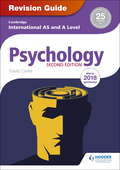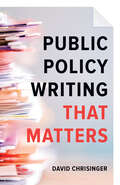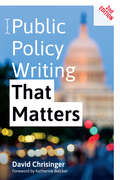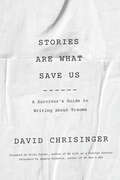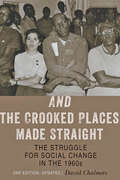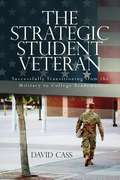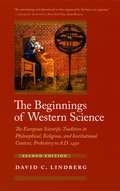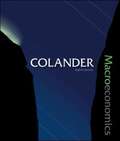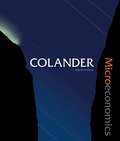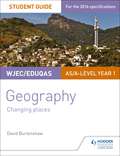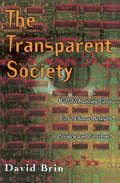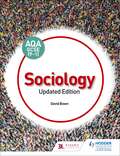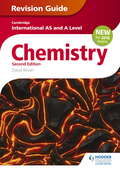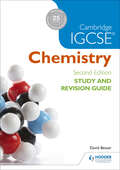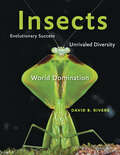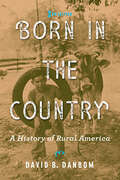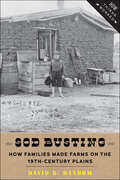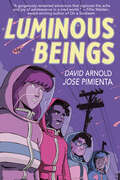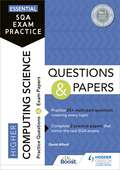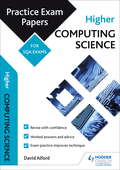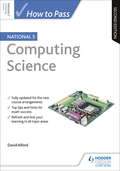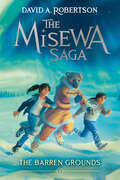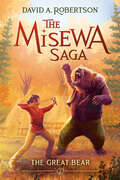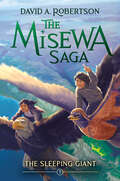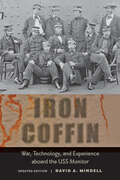- Table View
- List View
Cambridge International AS/A Level Psychology Revision Guide 2nd edition
by David ClarkeReinforce and practise skills learned with step-by-step support from experts to help you achieve your maximum potential.- Avoid mistakes and common misconceptions with step-by-step support, advice and clarification of key points from an expert author.- Build knowledge of key theories and studies with research summaries and evaluation notes.- Test and consolidate your knowledge with exam-style questions and answers.- Have confidence in your study with end-of-topic questions and answers to enable you to tick off each subject as you complete it, and a revision planner to help pace study.
Public Policy Writing That Matters
by David ChrisingerHone your public policy writing—and make a significant impact on the world.Students and professionals across a variety of disciplines need to write public policy in a manner that inspires action and genuine change. You may have amazing ideas about how to improve the world, but if you aren’t able to communicate these ideas well, they simply won’t become reality. In Public Policy Writing That Matters, communications specialist David Chrisinger argues that public policy writing is most persuasive when it tells clear, concrete stories about people doing things. Combining helpful hints and cautionary tales with writing exercises and excerpts from sample policy documents, Chrisinger teaches readers to craft concise, story-driven pieces that exceed the stylistic requirements and limitations of traditional policy writing.Too often, public policy writing is convoluted, opaque, and exclusive. Chrisinger, who teaches introductory policy writing courses around the country, offers a step-by-step guide for anyone interested in planning, organizing, developing, writing, and revising accessible public policy. From the most effective use of data visualization, the best way to write a sentence, and the ideal moment to add a compelling anecdote to advice on using facts to strengthen an argument, this little book, inspired by Strunk & White’s classic style guide, will allow anyone crafting public policy to make a bigger impact. Aimed at helping students and professionals overcome their default impulses to merely "explain," this book reveals proven, classroom-tested tips for writing sophisticated policy that is also easy to understand. This practical, concise handbook will not only aid students throughout graduate school but will also remain a reference to consult throughout their professional careers. A vital tool for any policy writer or analyst, Public Policy Writing That Matters is a book for everyone passionate about using writing to effect real and lasting change.
Public Policy Writing That Matters
by David ChrisingerA thoroughly updated and expanded guide to honing your public policy writing skills—and making a significant impact on the world.Professionals across a variety of disciplines need to write about public policy in a manner that inspires action and genuine change. You may have amazing ideas about how to improve the world, but if you aren't able to communicate these ideas well, they simply won't become a reality. In Public Policy Writing That Matters, communications expert David Chrisinger, who directs the Harris Writing Program at the University of Chicago and worked in the US Government Accountability Office for a decade, argues that public policy writing is most persuasive when it tells clear, concrete stories about people doing things. Combining helpful hints and cautionary tales with writing exercises and excerpts from sample policy analysis, Chrisinger teaches readers to craft concise, story-driven pieces that exceed the stylistic requirements and limitations of traditional policy writing.Aimed at helping students and professionals overcome their default impulses to merely "explain," this book reveals proven tips—tested in the real world and in the classroom—for writing sophisticated policy analysis that is also easy to understand. For anyone interested in planning, organizing, developing, writing, and revising accessible public policy, Chrisinger offers a step-by-step guide that covers everything from the most effective use of data visualization to the best ways to write a sentence, from the ideal moment for adding a compelling anecdote to advice on using facts to strengthen an argument. This second edition addresses the current political climate and touches on policy changes that have occurred since the book was originally published. A vital tool for any policy writer or analyst, Public Policy Writing That Matters is a book for everyone passionate about using writing to effect real and lasting change.
Stories Are What Save Us: A Survivor's Guide to Writing about Trauma
by David ChrisingerA seasoned writer and teacher of memoir explores both the difficulties inherent in writing about personal trauma and the techniques for doing so in a compelling way.Since 2013, David Chrisinger has taught military veterans, their families, and other trauma survivors how to make sense of and recount their stories of loss and transformation. The lessons he imparts can be used by anyone who has ever experienced trauma, particularly people with a deep need to share that experience in a way that leads to connection and understanding. In Stories Are What Save Us, Chrisinger shows—through writing exercises, memoir excerpts, and lessons he's learned from his students—the most efficient ways to uncover and effectively communicate what you've learned while fighting your life's battles, whatever they may be. Chrisinger explores both the difficulties inherent in writing about personal trauma and the techniques for doing so in a compelling way. Weaving together his journey as a writer, editor, and teacher, he reveals his own deeply personal story of family trauma and abuse and explains how his life has informed his writing. Part craft guide, part memoir, and part teacher's handbook, Stories Are What Save Us presents readers with a wide range of craft tools and storytelling structures that Chrisinger and his students have used to process conflict in their own lives, creating beautiful stories of growth and transformation. Throughout, this profoundly moving, laser-focused book exemplifies the very lessons it strives to teach. A foreword by former soldier and memoirist Brian Turner, author of My Life as a Foreign Country, and an afterword by military wife and memoirist Angela Ricketts, author of No Man's War: Irreverent Confessions of an Infantry Wife, bookend the volume.
And the Crooked Places Made Straight: The Struggle for Social Change in the 1960s (The American Moment)
by David ChalmersUpdated and revised, this is the best short interpretive history of the U.S. in the 1960s.David Chalmers's widely acclaimed overview of the 1960s describes how the civil rights movement touched off a growing challenge to traditional values and arrangements. Chalmers recounts the judicial revolution that set national standards for race, politics, policing, and privacy. He examines the long, losing war on poverty and the struggle between the media and the government over the war in Vietnam. He follows feminism's "second wave" and the emergence of the environmental, consumer, and citizen action movements. He also explores the worlds of rock, sex, and drugs, and the entwining of the youth culture, the counterculture, and the American marketplace.This newly revised edition covers the conservative counter-revolution and cultural wars. It carries the legacy of the 1960s forward: from Tom Hayden’s idealistic 1962 Port Huron Statement through Newt Gingrich’s 1994 "Contract with America" and Grover Norquist’s twenty-first century "Tax Payer’s Protection Pledge."
The Strategic Student Veteran: Successfully Transitioning from the Military to College Academics
by David Cass<p>The college graduation rate for military veterans is unsatisfactory. While the life transition for veterans goes far beyond academics, by lessening the stress of the academic transition, the likelihood of collegiate success is significantly increased. <p>The goal of <i>The Strategic Student Veteran</i> is to help raise graduation rates amongst our nation's veterans. The reason so many college students under-perform is because they're not taught how to transition from the structured military environment to the unstructured college academic environment. <i>The Strategic Student Veteran</i> teaches college-bound military veterans how to make this transition and become self-reliant, successful students.
The Beginnings of Western Science: The European Scientific Tradition in Philosophical, Religious, and Institutional Context, Prehistory to A.D. 1450 (2nd edition)
by David C. LindbergWhen it was first published in 1992, The Beginnings of Western Science was lauded as the first successful attempt ever to present a unified account of both ancient and medieval science in a single volume. Chronicling the development of scientific ideas, practices, and institutions from pre-Socratic Greek philosophy to late-Medieval scholasticism, David C. Lindberg surveyed all the most important themes in the history of science, including developments in cosmology, astronomy, mechanics, optics, alchemy, natural history, and medicine. In addition, he offered an illuminating account of the transmission of Greek science to medieval Islam and subsequently to medieval Europe. Beginnings of Western Science was, and remains, a landmark in the history of science, shaping the way students and scholars understand these critically formative periods of scientific development. It reemerges here in a second edition that includes revisions on nearly every page, as well as several sections that have been completely rewritten. For example, the section on Islamic science has been thoroughly retooled to reveal the magnitude and sophistication of medieval Muslim scientific achievement. And the book now reflects a sharper awareness of the importance of Mesopotamian science for the development of Greek astronomy. In all, the second edition of The Beginnings of Western Science captures the current state of our understanding of more than two millennia of science and promises to continue to inspire both students and general readers.
Macroeconomics (8th Edition)
by David C. ColanderWritten in an informal colloquial style, this student-friendly Macroeconomics textbook does not sacrifice intellectual depth in its quest for accessibility. The author's primary concern is to instill "economic sensibility" in the student. Colander emphasizes the intellectual and historical context to which the economic models are applied. Distinguishing features found within Colander's text are: Cutting Edge and Modern Colloquial Style, Narrative Focus on Policy, Emphasis on the Importance of Institutions and History, Focus on Modeling. Economics is a method of reasoning, not truths. Presents Alternative Perspectives in Economics.
Microeconomics
by David C. ColanderWritten in an informal colloquial style, this student-friendly Principles of Microeconomics textbook does not sacrifice intellectual depth in its quest for accessibility. The author's primary concern is to instill "economic sensibility" in the student. Colander emphasizes the intellectual and historical context to which the economic models are applied. Distinguishing features found within Colander's text are: Cutting Edge and Modern Colloquial Style Narrative Focus on Policy Emphasis on the Importance of Institutions and History Focus on Modeling: Economics is a method of reasoning, not truths. Presents Alternative Perspectives in Economics
WJEC/Eduqas AS/A-level Geography Student Guide 1: Changing Places
by David BurtenshawReinforce students' geographical understanding throughout their course; clear topic summaries with sample questions and answers help students improve their exam technique and achieve their best.Written by a teacher with extensive examining experience, this guide:- Helps students identify what they need to know with a concise summary of the topics examined at AS and A-level- Consolidates understanding through assessment tips and knowledge-check questions- Offers opportunities for students to improve their exam technique by consulting sample graded answers to exam-style questions- Develops independent learning and research skills- Provides the content students need to produce their own revision notes
The Transparent Society: Will Technology Force Us To Choose Between Privacy And Freedom?
by David BrinIn New York and Baltimore, police cameras scan public areas twenty-four hours a day. Huge commercial databases track you finances and sell that information to anyone willing to pay. Host sites on the World Wide Web record every page you view, and "smart" toll roads know where you drive. Every day, new technology nibbles at our privacy.Does that make you nervous? David Brin is worried, but not just about privacy. He fears that society will overreact to these technologies by restricting the flow of information, frantically enforcing a reign of secrecy. Such measures, he warns, won't really preserve our privacy. Governments, the wealthy, criminals, and the techno-elite will still find ways to watch us. But we'll have fewer ways to watch them. We'll lose the key to a free society: accountability.The Transparent Society is a call for "reciprocal transparency." If police cameras watch us, shouldn't we be able to watch police stations? If credit bureaus sell our data, shouldn't we know who buys it? Rather than cling to an illusion of anonymity-a historical anomaly, given our origins in close-knit villages-we should focus on guarding the most important forms of privacy and preserving mutual accountability. The biggest threat to our freedom, Brin warns, is that surveillance technology will be used by too few people, now by too many.A society of glass houses may seem too fragile. Fearing technology-aided crime, governments seek to restrict online anonymity; fearing technology-aided tyranny, citizens call for encrypting all data. Brins shows how, contrary to both approaches, windows offer us much better protection than walls; after all, the strongest deterrent against snooping has always been the fear of being spotted. Furthermore, Brin argues, Western culture now encourages eccentricity-we're programmed to rebel! That gives our society a natural protection against error and wrong-doing, like a body's immune system. But "social T-cells" need openness to spot trouble and get the word out. The Transparent Society is full of such provocative and far-reaching analysis.The inescapable rush of technology is forcing us to make new choices about how we want to live. This daring book reminds us that an open society is more robust and flexible than one where secrecy reigns. In an era of gnat-sized cameras, universal databases, and clothes-penetrating radar, it will be more vital than ever for us to be able to watch the watchers. With reciprocal transparency we can detect dangers early and expose wrong-doers. We can gauge the credibility of pundits and politicians. We can share technological advances and news. But all of these benefits depend on the free, two-way flow of information.
AQA GCSE (9-1) Sociology, Updated Edition
by David BownFully revised and updated, AQA GCSE (9-1) Sociology will guide your students, topic-by-topic, through the 2017 specification, with features specially designed to be accessible to all students so they can:- ensure they have understood each topic and grasped key points with Content Summaries and Check your understanding questions- consolidate their knowledge with activities and extension opportunities to take them beyond the text- define and use key terms in the specification with confidence- use Research in Action sections to understand the work of key sociologists- prepare for assessments with Practice Questions based on the 2017 specification, together with answer guidance and commentaryAQA GCSE (9-1) Sociology has been reviewed by Sociology academics to ensure all content is accurate, sensitive, contextualised and evidence-based.
Cambridge International AS/A Level Chemistry Revision Guide 2nd edition
by David BevanGet your best grades with this exam-focused text that will guide you through the content and skills you need to prepare for the big day.Manage your own revision with step-by-step support from experienced examiner and author David Bevan. This guide also includes a Questions and Answers section with exam-style questions, student's answers for each question, and examiner comments to ensure you're exam-ready.- Plan and pace your revision with the revision planner- Use the expert tips to clarify key points- Avoid making typical mistakes with expert advice- Test yourself with end-of-topic questions and answers and tick off each topic as you complete it- Practise your exam skills with exam-style questions and answersThis title has not been through the Cambridge endorsement process.
Cambridge IGCSE Chemistry Study and Revision Guide
by David BesserProviding guidance that helps students practice and troubleshoot their exam technique, these books send them into their exam with the confidence to aim for the best grades.- Enables students to avoid common misconceptions and mistakes by highlighting them throughout- Builds students' skills constructing and writing answers as they progress through a range of practice questions- Allows students to mark their own responses and easily identify areas for improvement using the answers in the back of the book- Helps students target their revision and focus on important concepts and skills with key objectives at the beginning of every chapter- Ensures that students maximise their time in the exam by including examiner's tops and suggestions on how to approach the questionsThis title has not been through the Cambridge International Examinations endorsement process.
Insects: Evolutionary Success, Unrivaled Diversity, and World Domination
by David B. RiversAn introduction to the intriguing world of insects, from bullet ants to butterflies.Designed as an introduction to the intriguing world of insect biology, this book examines familiar entomological topics in nontraditional ways. Author David B. Rivers gives important concepts relatable context through a pop culture lens, and he covers subjects that are not typical for entomology textbooks, including the impact of insects on the human condition, the sex lives of insects, why insects are phat but not fat, forensic entomology, and the threats that some insects pose to humanity. Each chapter presents clear and concise key concepts, chapter reviews, review questions following Bloom’s taxonomy of learning, web links to videos and other resources, and breakout boxes (called Fly Spots) that capture student interest with unique and entertaining facts related to entomology. Focusing on both traditional and cutting-edge aspects of insect biology and packed with extensive learning resources, Insects covers a wide range of topics suitable for life science majors, as well as non-science students, including: • the positive and negative influences of insects on everyday human life• insect abundance• insect classification (here presented in the context of social media)• insect feeding, communication, defense, and sex• how insects are responding to climate change• forensic entomology• how insects can be used as weapons of war• how insects relate to national security• why insects have wings• how to read pesticide labels
Born in the Country: A History of Rural America (Revisiting Rural America)
by David B. DanbomThe definitive history of life in rural America.Throughout most of its history, America has been a rural nation, largely made up of farmers. David B. Danbom's Born in the Country was the first—and still is the only—general history of rural America. Ranging from pre-Columbian times to the enormous changes of the twentieth century, the book masterfully integrates agricultural, technological, and economic themes with new questions about the American experience.Danbom employs the stories of particular farm families to illustrate the experiences of rural people. This substantially revised and updated third edition • expands and deepens its coverage of the late twentieth and early twenty-first centuries• focuses on the changes in agriculture and rural life in the progressive and New Deal eras as well as the massive shifts that have taken place since 1945• adds new information about African American and Native American agricultural experiences• discusses the decline of agriculture as a productive enterprise and its impact on farm families and communities• explores rural culture, gender issues, agriculture, and the environment• traces the relationship among farmers, agribusiness, and consumersIn a new and provocative concluding chapter, Danbom reflects on increasing consumer disenchantment with and resistance to modern agriculture as well as the transformation of rural America into a place where farmers are a shrinking minority. Ultimately, he asks whether a distinctive style of rural life exists any longer.
Sod Busting: How Families Made Farms on the Nineteenth-Century Plains (How Things Worked)
by David B. DanbomHow settlers transformed America’s most inhospitable frontier into an economic powerhousePrairie busting is central to the lore of westward expansion, but how was it actually accomplished with little more than animal and human power? In Sod Busting, David B. Danbom tells the story of Great Plains settlement in a way it has seldom been told before. Stretching beyond the sweeping accounts typical of standard textbooks, Danbom challenges students to think about the many practicalities of surviving on the Great Plains in the late nineteenth century by providing a detailed account of how settlers acquired land and made homes, farms, and communities. He examines the physical and climatic obstacles of the plains—perhaps America’s most inhospitable frontier—and shows how settlers sheltered themselves, gained access to fuel and water, and broke the land for agriculture. Treating the Great Plains as a post-industrial frontier, Danbom delves into the economic motivations of settlers, as well as the physically and economically difficult process of farm making. He explains how settlers got the capital they needed to succeed and how they used the labor of the entire family to survive until farms returned profits. He examines closely the business decisions that determined the success or failure of these farmers in a boom-and-bust economy; details the creation of churches, schools, and service centers that enriched the social and material lives of the settlers; and shows how the support of government, railroads, and other businesses contributed to the success of plains settlement.Based on contemporary accounts, settlers’ reminiscences, and the work of other historians, Sod Busting dives deeply into the practical realities of how things worked to make vivid one of the quintessentially American experiences, breaking new land.
Luminous Beings: A Graphic Novel
by David Arnold"A gorgeously rendered adventure that captures the ache and joy of adolescence in a mad world."--Tillie Walden, award-winning author of On a SunbeamTy and Burger have known each other since before they could walk. But this shared history is nothing compared to their plans for the future: step one, make a killer documentary about humanity&’s recent brush with extinction; step two, apply to film school together; step three, achieve legendary status as the next great filmmaking duo. But Ty has a secret that will ultimately shake the foundations of their friendship and force them both to wonder if growing up means letting go of the people they once were.With heads full of bioluminescence and hearts full of fury, &“squizzies&” have one thing on their tiny rodent brains: global annihilation. Their reign of terror may be a thing of the past, but Ty and Burger are determined to chronicle the perseverance of the human race in the wake of the &“squirrel-pocalypse.&” With friends Miles and Fib, they embark on an overnight excursion through rowdy nightclubs, once-familiar neighborhoods, perilous castles, and off-grid RVs, all the while, recording quiet lives of love and loss in a strange new world.Set over the course of a single day, Luminous Beings explores the many facets of friendship and love, the heavy burden of a well-kept secret, the boundless tenacity of the human spirit, and, yes, the furriest of all zombified mammals. But don&’t worry, it&’s not the end of the world. Just the end of the squirrel
Essential SQA Exam Practice: Higher Computing Science Questions and Papers
by David AlfordExam board: SQALevel: HigherSubject: Computing ScienceFirst teaching: September 2018First exam: Summer 2019Practice makes permanent. Feel confident and prepared for the SQA Higher Computing Science exam with this two-in-one book, containing practice questions for every topic, plus two full practice papers - all written by an experienced marker.- Choose which topics you want to revise: A simple grid enables you to pick particular areas of the course that you want to answer questions on, with solutions provided at the back of the book- Remember more in your exam: Repeated and extended practice will give you a secure knowledge of the key areas of the course (software design and development; computer systems; database design and development; web design and development) Familiarise yourself with the exam paper: Both practice papers mirror the language and layout of the real SQA papers; complete them in timed, exam-style conditions to increase your confidence before the exams- Find out how to achieve a better grade: Answers to the practice papers have commentaries for each question, with tips on writing successful answers and avoiding common mistakesFully up to date with SQA's requirementsThe questions, mark schemes and guidance in this practice book match the requirements of the revised SQA Higher Computing Science specification for examination from 2019 onwards.
Higher Computing Science: HCOMPPEP
by David AlfordPractise for your SQA exams with three specially-commissioned Hodder Gibson Practice Exam Papers.- Practise with model papers written and checked by experienced markers and examiners- Get extra advice with specially-written study-skills guidance sections- Gain vital extra marks and avoid common mistakes with examiner tips
How to Pass National 5 Computing Science: Second Edition
by David AlfordExam Board: SQALevel: National 5Subject: Computing ScienceFirst Teaching: August 2017First Exam: May 2018Get your best grade with the SQA endorsed guide to National 5 Computing Science.Fully updated to account for the removal of Unit Assessments and the changes to the National 5 exam, this book contains all the advice and support you need to revise successfully. It combines an overview of the course syllabus with advice from a top expert on how to improve exam performance, so you have the best chance of success.- Refresh your knowledge with complete course notes- Prepare for the exam with top tips and hints on revision technique- Get your best grade with advice on how to gain those vital extra marks
The Barren Grounds: The Misewa Saga, Book One (The Misewa Saga #1)
by David A. RobertsonNarnia meets traditional Indigenous stories of the sky and constellations in an epic middle grade fantasy series from award-winning author David Robertson.Morgan and Eli, two Indigenous children forced away from their families and communities, are brought together in a foster home in Winnipeg, Manitoba. They each feel disconnected, from their culture and each other, and struggle to fit in at school and at their new home -- until they find a secret place, walled off in an unfinished attic bedroom. A portal opens to another reality, Askí, bringing them onto frozen, barren grounds, where they meet Ochek (Fisher). The only hunter supporting his starving community, Misewa, Ochek welcomes the human children, teaching them traditional ways to survive. But as the need for food becomes desperate, they embark on a dangerous mission. Accompanied by Arik, a sassy Squirrel they catch stealing from the trapline, they try to save Misewa before the icy grip of winter freezes everything -- including them.
The Great Bear: The Misewa Saga, Book Two (The Misewa Saga #2)
by David A. RobertsonIn this second book in the Narnia-inspired Indigenous middle-grade fantasy series, Eli and Morgan journey once more to Misewa, travelling back in time.Back at home after their first adventure in the Barren Grounds, Eli and Morgan each struggle with personal issues: Eli is being bullied at school, and tries to hide it from Morgan, while Morgan has to make an important decision about her birth mother. They turn to the place where they know they can learn the most, and make the journey to Misewa to visit their animal friends. This time they travel back in time and meet a young fisher that might just be their lost friend. But they discover that the village is once again in peril, and they must dig deep within themselves to find the strength to protect their beloved friends. Can they carry this strength back home to face their own challenges?
The Sleeping Giant: The Misewa Saga, Book Five (The Misewa Saga #5)
by David A. RobertsonEli and Morgan embark on a dangerous mission to rescue kidnapped animal beings in this new adventure in the award-winning, Narnia-inspired Indigenous middle-grade fantasy series.Eli, Morgan and Emily embark on their most dangerous mission yet, to save the kidnapped animal beings of Ministik. But before they can reach the heavily guarded Land of the Sleeping Giant, Eli must rally more help, not just from old friends, but from surprising new allies. And he must rely on a new way to travel: on the back of the leader of the Bird Warriors himself, Pip. Together they will journey across the North Country, on a mission to reconnect the Bird Warriors, as well as confront old enemies. But even as he must fight for his life – and the lives of his friends and new family – Eli must also come to terms with his newfound knowledge: What does it mean that he is only part human?
Iron Coffin: War, Technology, and Experience aboard the USS Monitor (Johns Hopkins Introductory Studies in the History of Technology)
by David A. MindellThe USS Monitor famously battled the CSS Virginia (the armored and refitted USS Merrimack) at Hampton Roads in March 1862. This updated edition of David A. Mindell's classic account of the ironclad warships and the human dimension of modern warfare commemorates the 150th anniversary of this historic encounter.Mindell explores how mariners—fighting "blindly," below the waterline—lived in and coped with the metal monster they called the "iron coffin." He investigates how the ironclad technology, new to war in the nineteenth century, changed not only the tools but also the experience of combat and anticipated today’s world of mechanized, pushbutton warfare. The writings of William Frederick Keeler, the ship’s paymaster, inform much of this book, as do the experiences of everyman sailor George Geer, who held Keeler in some contempt. Mindell uses their compelling stories, and those of other shipmates, to recreate the thrills and dangers of living and fighting aboard this superweapon. Recently, pieces of the Monitor wreck have been raised from their watery grave, and with them, information about the ship continues to be discovered. A new epilogue describes the recovery of the Monitor turret and its display at the USS Monitor Museum in Newport News, Virginia.This sensitive and enthralling history of the USS Monitor ensures that this fateful ship, and the men who served on it, will be remembered for generations to come.
